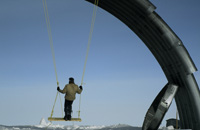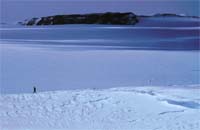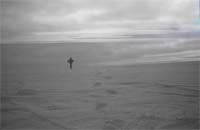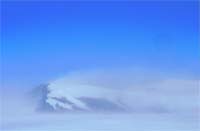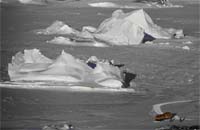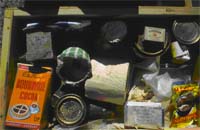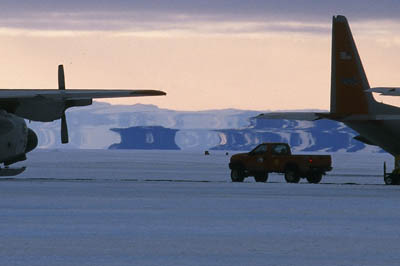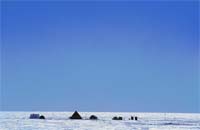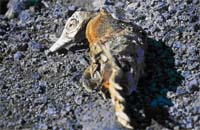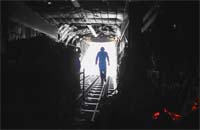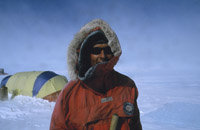Vostok, or A Brief and Awkward Tour of the End of the Earth
published online at www.WorldHum.com in 2006, and selected for Best American Travel Writing 2006
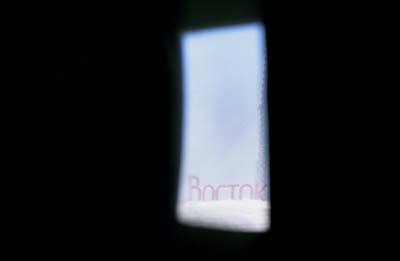
"A man who's warm cannot understand a man who's freezing."
—Alexander Solzhenitsyn, A Day In The Life Of Ivan Denisovich
January 26, 2000: The impossible murmurs of bearded Russians followed me into the small empty dining room. Spare and plain, the room reeked so much of old culture and simple food that it seemed a survivor of ice ages and continental drift. Years of tobacco smoke and grease had browned the high pale-yellow ceiling. Much of the paint on the ceiling, and on the yellow walls, had long ago flaked off: above, dark rust bloomed, while below an older icy blue spread like frost, as if the snow outside the windows had seeped through. Small colorful paintings, mostly homemade rural and tropical scenes, gave a tilted hope to the hard-worn room.
A mound of boiled eggs glistened in a large bowl like dabs of white paint. Withered window box plants stood silhouetted against the snow. In the dusty light, scuffed dark tables held slabs of black bread, a brick of yellow butter, and a plate of sliced pink salami. On the sideboard, a massive cutting board and heavy cleaver wore the deep scars of years: the labor, hunger, anger, and celebrations of men living difficult, cloistered lives. I'd walked into a Russian still-life that seemed to breathe in its dark frame.
The cook, with broad-striped shirt and broader smile, walked in from the kitchen to offer me tea. His arms were open, with a cup held in one hand. To this day, I wish I had accepted.
This was almost six years ago, and I have not been back. But trust me when I assume that the scene there has not changed since. And the odds that you will find your way there to see for yourself are infinitesimal. You will not stumble onto this weathered colony, or follow a guidebook to its doorstep; you will not drink the tea I declined.
The place? Vostok Station, Antarctica. A research base huddled against the flat white icescape of the polar plateau, Vostok is the farthest terrestrial outpost of an impoverished Russian empire. Occupied since 1957, Vostok is also the most isolated of Antarctic bases. Its few old buildings sit in the middle of the godforsaken East Antarctic ice cap, near the South Geomagnetic Pole, at an elevation of 11,220 ft. It is as far away from anywhere you can go without leaving the planet. Vostok ("East") is also officially the coldest place on Earth, once reaching a ghastly winter temperature of -129° F. Even in midsummer, -20° F would constitute a heat wave. Two dozen men work in the cold here each summer, and of those only a dozen will stay for the brutal winter. Still bridging the gap between the old wood-and-canvas "heroic age" of Antarctic exploration and the digital age of technological occupation, the Russians at bitter Vostok contend with conditions long forgotten by other Antarctic workers.
A transient, I was still bundled up in my deluxe government-issued parka as I shuffled between the modest invitations of the dining tables. I had arrived minutes before on a flight from McMurdo Station, the hub of the USAP (United States Antarctic Program), with a rare chance to see Vostok. Camera in hand, I was on the prowl for images.
The strangeness of entering another culture in central Antarctica was almost dreamlike. How could I walk in from the palpable center of nowhere and find a stained wooden home extracted from the hard pages of Solzhenitsyn? McMurdo, like most Antarctic bases, strives for the bright shiny architectural hallmarks of science fiction. It is as old as Vostok, but uses as much of its research budget as possible to replace the run-down buildings. Vostok has no such pretensions.
I flew to Vostok on one of what has become an annual set of three USAP flights to deliver Russian personnel, New Zealand vegetables, and American fuel. Vostok has been traditionally supplied from the Russian coastal base of Mirnyy via three or four flights, or by a string of antique tracked vehicles that crawl up onto the plateau along a brutal 900 mile route. But Russia scarcely has the money to fund the kind of Soviet cold war presence they once had, especially at this most isolated of bases. The traverse vehicles break down too often.
NASA and the National Science Foundation (NSF) are very interested in doing science in Vostok's front yard. The Russian crews excel at drilling ice cores, and have produced the world's deepest core, pulling up 400,000 years of atmospheric history in the process. The station, and that hole, also happen to rest directly above a subglacial reservoir of great mystery. Lake Vostok, as it's called, is the size of Lake Ontario, even though it lays hidden under two and a half miles of ice. My Antarctic job at the time was as a Fuels Operator: like 75% of Antarctica's population, I'm not a researcher. Most of us create and support the infrastructure from which researchers do their work. I ran temporary fueling systems in McMurdo and remote sites, I fueled helicopters and planes, and I drove a fuel truck. On this trip, I was to help with the transfer of much-needed fuel from the plane into Vostok's tanks.
On board, but still on the ground in McMurdo, I was told by the Air Force loadmaster that the mission was for cargo only, and would offload no fuel. I suffered a brief ethical crisis, thinking that I might as well jump off and go back to work in town.
I survived the crisis by deciding to help the aircrew avoid deluding themselves or damaging their plane: the loadmaster had also told me he wanted me to help them take fuel from the Russians if need be. Though I explained to him (over the roar of the engines) that we neither had the hardware nor the desire to suck up their very questionable fuel, and that the Russians can't afford to give any of it away, he remained unconvinced. He was the confused messenger for a confused message. So I quickly sat down and buckled up for my little adventure.
This trip was a lark right from the start, but a lark to a place that few people have seen. It's a trip I would lie to take.
No one visits Vostok. It is not situated at the charismatic abstraction we call the South Pole, where the U.S. set up its own East Antarctic base in 1957. It barely exists in the currency of guess-where-I-went. Visitors to the South Pole quickly find themselves lost in the cargo lines and outbuildings of America's sprawling operation. The Amundsen-Scott South Pole Station centers on a gigantic geodesic dome and several elevated buildings like lunar modules, employs well over 200 people each summer, and manages several multi-million dollar astrophysical experiments.
Vostok, on the other hand, looks to the approaching eye like a small broken blister on the ice cap's alabaster skin. Mostly submerged by 40 years of accumulating snow, the station (several old small buildings - McMurdo has 100) is not a showpiece: scattered broken-down equipment reminded me of junk-filled yards in rural America. Vostok, the earnest product of an intellectual nation, has the hollow look of poverty.
We left McMurdo with a dozen Russian men, their bags, and cargo pallets stacked with food. These men, fresh from the world, were about to spend the Antarctic winter isolated under severe conditions, yet their food shipment carried on top only a modicum of fresh potatoes, carrots, garlic, onions, and a few days' worth of fruit. Under this garnish was the essential menu item: bags and bags of frozen homefries. Grease and potatoes, night in and night out, for the next year. Wintering over is hardship duty in extremis. There is no way out. People sometimes fall apart, with small irritations mutating into seething disputes. Several winters at the relatively comfy South Pole have ended with a once-joyful community split into enraged factions. And Antarctica's most notorious event took place during a Vostok winter: a chess game ended in an ax murder.
Most appeared to sleep as we rose over the Transantarctic Mountains and droned across the immense East Antarctic ice sheet. Their winter station manager, however, the man with the responsibility for keeping all twelve men safe and sane, kept his eyes open, staring at nothing.
Some faces among the Russians startled me, with stark features marked by poor nutrition. I thought of American civil war era faces staring out from sepia-toned photos. Carved and rugged, dark and impassive: and these were the men who had not yet spent their year on the ice.
Some of the lines on their faces may have been from jetlag. They flew out of St. Petersburg to Amsterdam to Singapore to Sydney to Christchurch to McMurdo on an epic one-way ticket. On this final flight, they had plenty of legroom, but in the roar and hydraulic groans of the American military plane, there was little chance for conversation. None of them spoke English, and only one of us spoke Russian.
Onboard with me were Jim, a long-time McMurdo manager; a doctor, who had been asked to consult about an ill Vostok resident; and Lena, my Russian-born friend pulled away from her research to act as translator for the medical consultation.
Up in the air, we veered across Antarctica's bent tapestry of tightly-packed lines of longitude. For three hours of our months-long summer day, we sailed over the blank clock face of the ice cap. Time zones passed beneath us like crevasses.
We landed, on the hard snow of the plateau. Our flight had launched in the balmy 30°F of McMurdo, and landed in Vostok's -30°F: we'd climbed up to the jet stream, and only come partway down. Around the skiway (a runway for planes on skis) was perfect flat whiteness, under a perfect blue bell jar of sky. Breaking up the emptiness were an immense radio antenna and the "BOCTOK" sign at its foot. Each seven-foot-high Cyrillic letter (red, of course) stood alone, like the famous Hollywood sign. The snow beneath us was like light cement. Zero humidity, deep cold, little accumulation, and steady winds create tiny snow grains and ice crystals that sinter into an airy white pavement. You can just as easily land a plane on it as cut it with a saw.
One man, just off the plane, with nothing before him but the fringe of the buried outpost, pulled off his hat, pulled out a pocket mirror, and checked his mussed black hair. I was reminded of Sir Ernest Shackleton's Endurance journey, in which Shackleton, Crean, and Worsely, having arrived at Stromness whaling station after 17 horrendous months, began to fuss with haggard soot-caked hair and ragged clothes. Their concern, however, was that there might be women: here at Vostok, this was unlikely. Women have on rare occasion done summer science here, but no woman has ever wintered at this small male-only plywood space station.
Lena told me later that one of the men had boasted of his monthly salary to her, higher than he could hope to find at home. When he asked Lena if she made good money, too, she demurred: she had the compassion not to tell him that, as a young science tech on a NASA-funded aerogeophysical project, she earned his salary in a week.
Once I'd been assured that our crew wasn't going to try to take fuel, I set off over the white rise - years of plowed-out snow - toward the station. The visible exteriors of the station buildings were sun-bleached and rusting. Vehicles slumped over with sagging tracks littered the outskirts. Stepping into the small common area of the main building, I found the arriving men had immediately begun smoking their raw Russian cigarettes with the others, talking quietly around an old billiards table. They sat in smoke as dense as their Antarctic beards. Decades of smoke seeping into cracks in the balls and wooden rails left a stain the color of sunburned grass.
When Lena came in a moment later from the doctor's consultation, she was surrounded, but not harassed. Her language skills and beauty were the focus of an intensely stoic group of men. Though the Russians were calm, it was interesting to watch their manifest desire to speak with her. Some had not seen a woman for a year, and the others now had that fate before them. Mainly the men wanted to know about her: Lena said later they did not talk much of themselves, though I think they must, coming or going, feel the self exposed by life on the edge of space. What I noticed especially was the occasional glance, and pause in their step, around Lena: what baggage such a glance may carry, the last some of the men had of the warm world before slipping into the long Antarctic night.
In the dining room, Jim stepped in for a moment, in the midst of enjoying his own Vostok lark. But he had his own awe to share, too: he told me that the room looked exactly as it did during his last visit, 22 years earlier, except that Stalin's portrait had come down. Perhaps it had been replaced with the large black-and-white photo of a pair of emperor penguins which, even after a year in the Antarctic, Vostok residents will never see. Vostok is farther from penguins than the average American citizen is from the nearest zoo that puts them on display.
It was then that the cook, with his smile, offered me some tea. He was the only Russian at the camp that I spoke with (in untranslated phrases), and it lasted just a few seconds. I paused in my bustling exploration - so much to see, a mental map to make - to consider his kindness. Then, to my regret, I declined, so I could spend my last twenty minutes outside, taking bleak photos of their industrial graveyard. I wanted to frame the strangeness, as if I was the empty icescape.
And maybe I was. What was this trip? Not work, certainly, and scarcely travel. As I look back, I remember my big red parka as a bubble of self-absorption: I had found my way to one of the rarer places in the world, but didn't have the insight to take off my coat and sit down? Pathetic. As proof of my disconnect, the photographs I took of Vostok are dismal - blurry, fragmented and boring. One exception is an abstract of the BOCTOK sign seen through a window of the plane, taken on arrival, before I'd replaced awe with a nervous intellectual hobby.
Even as I clicked off my roll of film, I realized I should instead have sat with this cook to sip some tea, eat an egg, and slab some butter onto the local bread. I tried to see this strange place from the outside instead of taking the time to taste it. That was bad traveling. I bypassed Vostok, Russia, and the warm human thread stretched thin between them. I wish very much that I could go back and do it right. But even this wish is a tourist's wish.
Soon it was time to go. I loaded up silently with the departing Russians, including the very pale patient whose brief diagnosis no one would mention. Jim moved up into the cockpit for his privileged view over the planet's empty quarter. A few returnees sat with Lena, talking to her above the deep whine of the engines, resocializing themselves as they began their ascent into the warm latitudes. None of them had complaints. Vostok is a place of hardship, but it's also a landscape of their choosing. Like many of us, many of them return to the ice again and again. The Russians, however, have no expectation of comfort. Later, Lena ranted about it in an email: "The russians definitely have a MUCH higher suffering tolerance than the americans. While I hear a lot of complaining about a lack of A-1 steak sauce and broken hot tub pumps from our stars & stripes buddies, you ask the russians about a winter at vostok where they ran out of fuel, and they say 'it was ok.'"
As it turned out, Vostok did almost run out of fuel that winter, saved only by curtailing operations and reducing their living space. Distant Russian authorities in St. Petersburg had requested from the USAP a mere 5000 gallon delivery, much less than Vostok needed. (South Pole station burns that much fuel in five winter days.) It's also possible that these men suffered because my flight brought them no fuel. My lark now feels like a crime.
During the flight home, two men played chess with astonishing speed. Watching from across the fuselage, I imagined them playing together daily through their stark year of dark months and white months. The small magnetic board passed back and forth between them like an endless plate of hors d'oeuvres.
|
© Copyright Jason Anthony All rights reserved. |


